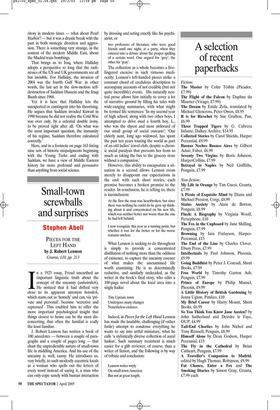Small-town screwballs and surprises
Stephen Abell
PIECES FOR THE LEFT HAND by J. Robert Lennon Granta, £10, pp. 213 In a 1925 essay, Freud unearthed an important linguistic truth about the concept of the uncanny (unheimlich). He noticed that it had drifted very close to its apparent antonym heimlich, which starts out as ‘homely’ and can, via ‘private and personal’, become ‘secretive and repressed’. This enabled him to offer the more important psychological insight that things closest to home can be the most disconcerting, that often the familial is really the least familiar.
J. Robert Lennon has written a book of 100 anecdotes — between a couple of paragraphs and a couple of pages long — that chart the unpredictable nature of small-town life in middling America. And his use of the uncanny is, well, canny. He introduces us, very briefly, to such modestly eccentric locals as a woman who spells out the letters of every word instead of saying it, a man who can only cope sanely with human interaction by dressing and acting exactly like his psychiatrist, or
two professors of literature who were good friends until one night, at a party, when they entered into a debate about the proper spelling of a certain word. One argued for ‘grey’, the other for ‘gray’.
The collection as a whole becomes a fivefingered exercise in such virtuoso mediocrity; Lennon’s left-handed pieces strike a constant chord of credulous description to accompany accounts of not credible (but not quite incredible) events. His naturally neutral prose allows him initially to cover a lot of narrative ground by filling his tales with wide-ranging summaries, with what might be termed life sentences: ‘In my second year of high school, along with two other boys, I attempted to drive mad a fourth boy, L., who was the shyest and most awkward of our small group of social outcasts’; ‘Our elderly aunt, long ago widowed, has spent the past ten years touring the world as part of an old ladies’ travel club, despite a chronic social paralysis that prevents her from so much as taking the bus to the grocery store without a companion.’ However, this ability to encapsulate a situation in a second allows Lennon room merely to disappoint our expectations in the end: with such short stories, each premise becomes a broken promise to the reader. In conclusion, he is telling us, there is inconclusion:
At the first the man was heartbroken, but since there was nothing he could do he gave up thinking about it and concentrated on his new life, which was neither better nor worse than the one he had left behind; I now recognize this year as a turning point, but whether it was for the better or for the worse remains unclear.
What Lennon is seeking to do throughout is simply to provide a concentrated distillation of nothing more than the oddness of existence, to capture the uncanny essence of what makes the unexamined life worth examining. He is as determinedly reductive, and similarly undecided, as the writer in the book’s final story, who edits a 100-page novel about the local area into a single haiku:
Tiny Upstate town Undergoes many changes Nonetheless endures.
Indeed, in Pieces for the Left Hand Lennon has made the laudable, challenging (if rather futile) attempt to condense everything he wants to say into artful miniature, what he calls ‘a stylistically diverse collection of aural haikus’. Such summary treatment is much easier for a glib reviewer, of course, than a writer of fiction, and the following is by way of tribute and conclusion:
Lennon writes wryly On small-town America; But not at great length.





























































 Previous page
Previous page